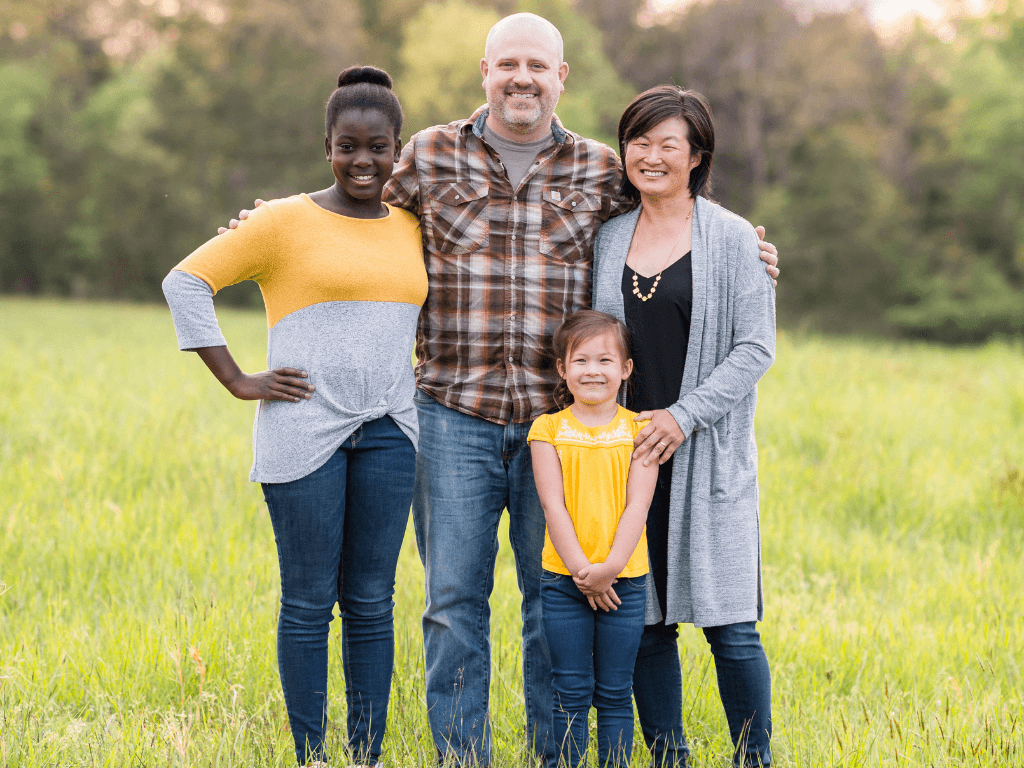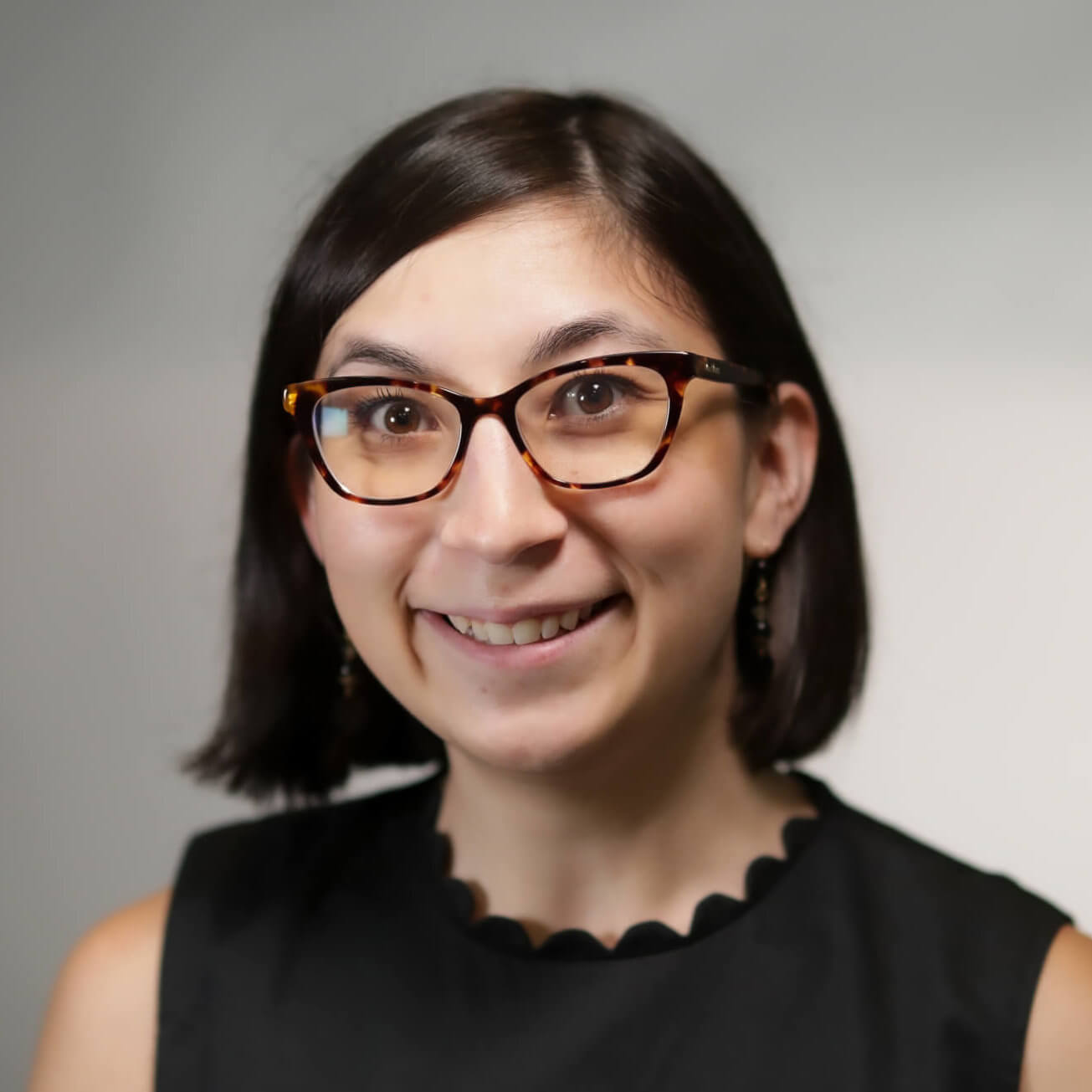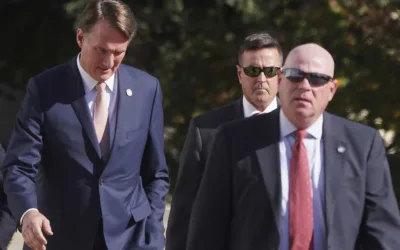
Joshua and his family (from left to right): Lucy, Joshua, Agnes, Minhee
Ahead of securing the nomination, Throneburg and his team campaigned throughout the Fifth District, one of the largest congressional districts in the commonwealth.
And then there was one: on April 12, Josh Throneburg announced that he had been chosen to be the Democratic candidate for Virginia’s Fifth District, negating the need for a June primary, which was supposed to be held June 21.
The other two candidates who were in the running for the nomination, Warren McClellan and Andy Parker, did not have enough valid signatures on their petitions to make it onto the ballot ahead of June’s primary which would’ve determined who would be the Democratic nominee going up against Republican incumbent Bob Good in November.
Throneburg and his team reached out to younger potential voters, as well as potential voters in rural areas, not only to spread the message on what the campaign was about, but to also meet with potential constituents who might not hear from their federal representatives that often.
This race is an important one this year, because it’s the first election since the congressional maps were updated in the most recent redistricting effort. There are new localities in the district, including Amelia, Goochland, Louisa, the city of Lynchburg, Nottoway, and a part of Hanover County, shifting the district’s boundaries further south and east.
A Democrat has not won a race in the district since Tom Perriello was elected in 2008. When he ran, the district’s boundaries were much different than they are today.
Following the announcement, Dogwood reached out to Throneburg for an email interview. The following answers have been edited for clarity.
Dogwood: What first inspired you to run for the Fifth District?
Josh Throneburg: My daughters [Lucy and Agnes]. They are 12 and 6 and I am deeply concerned about the world they’re going to inherit. Whether it is climate change, racism or the very existence of our democracy, there are big problems to solve and I want to be a part of solving them.
DW: What do you love most about living in the Fifth District?
JT: I love how the Fifth district is so diverse! You’ve got cities and country, working-class towns and academic centers, mountains and fields, and lots more. With a district so geographically large you get so much diversity, and I love it!
DW: How has your family supported you throughout the campaign?
JT: My wife [Minhee] is a rockstar. She’s my biggest supporter and a constant source of encouragement. Being on the campaign trail means less time at home for me and more work for her, and I’m so grateful for how she has rolled with that. I haven’t gotten everything right in life, but marrying her was like striking gold.
DW: How do you think you’ll be able to enact change across the district as a whole?
JT: The full answer here would require pages, maybe a book, but here’s one part of it: trust. I’m going to listen, and I’m going to learn, and I’m going to do my best to show people that I care about them, and their family, and I’m going to work every single day to make their life better. They may not agree with me on every position or policy, but I hope they’ll know I’m doing what I think is best for them and for the district, and I hope that honesty and authenticity will breed trust, and that trust will allow opportunity for real change and growth.
DW: What outreach do you have planned to reach potential constituents in the most northern and western parts of the district?
JT: Our plan is to show up–all the time, over and over–all the way into November. My goal for our team is to show up so much that people start asking, “What, you’re here again?!” We already have a field director who is in the northern part of the district and a field organizer in Lynchburg: we’ll keep adding to our team so that we can be at events, host town halls, knock doors, and reach as many people as possible.
DW: What are some of the most pressing issues you will be focusing on ahead of the election, and in addition to that, what do you think are the biggest challenges rural areas face today, and how do you plan to address that if elected?
JT: Climate change is the first priority for me. If we listen to scientists, their message is really clear: we have to stop burning stuff [i.e., producing carbon] as fast as possible if we want to avoid the most catastrophic effects of climate change. Our kids are in trouble – it’s up to us how bad that’s going to be. The exciting thing is that we can fight to save the planet and make billions of dollars at the same time. Investing in green energy and the green economy means lots of jobs with good pay and good benefits. There is so much money to be made in green technology and manufacturing, and happily, the most effective places to do that work also happen to be areas that are currently hard up for good jobs. So for both of those reasons, we can’t afford not to act and to act fast.
Beyond that, when you look at the rural areas of the district, what you see over and over are problems of access: access to broadband, access to healthcare–and comprehensive, affordable insurance–access to quality education, and access to jobs. Those are the practical issues we need to be working on immediately.
DW: How would you work with educators across the Fifth District to help strengthen public education?
JT: My mom taught fourth grade at the public school in town and I’m the product of a public education so I am passionate about our public schools providing a high quality, well-rounded education to our kids. If that is going to happen we need to invest, and invest heavily. That means top-notch facilities, higher pay for teachers and administrators, a comprehensive plan that includes substantial resources for parents, and much more. I believe we should invest in schools the way we invest in the military, with the intention of creating the best education environment in the world. I have already talked to numerous teachers, administrators and school board members across the district about what they are seeing and observing on the ground, and I’ll continue to listen and learn from the experts and then partner with them to make education the priority it should be. If you’d like more details, we’ve rolled out a really comprehensive education plan, which you can find on our website.
DW: How do you weave your pastoral duties and political aspirations together?
JT: The primary work of a pastor is to take a community of people and try to both serve and lead that community. Typically congregations are diverse community of people from different beliefs and backgrounds, and as their pastor you do everything you can to love, encourage, and support all of them. I hope my political life will look like that too. That’s kind of where the campaign motto of “Compassion and Common Sense” is born from. If I can have a posture of compassion toward people, and then make common sense decisions to make their life better, then I’ll be proud of the work I do as a politician.
DW: What are some of the most important things (to you) about becoming an elected official?
JT: I just want to serve in a way that provides tangible benefit for this district, both in the present and the future. There are too many people in Washington whose primary interest is their own career; they lose sight of the people they claim to be representing. I’m running for Congress simply because I think we need decent and discerning people sitting in the rooms where decisions are made that affect the lives of everyday Americans, and that’s what I hope to do.
DW: Is it possible to bring constituents together despite deepening divides in terms of politics and beliefs? How do you plan on achieving that?
JT: I sure hope so, because if it’s not, this democracy is in trouble. Yes, I believe it is. There is no doubt that this country is deeply divided right now, but we have been divided before. What we need now is to elect leaders that won’t continue to stoke the flames of division, but that can find a way to lead us through the fire into clearer skies on the other side. I think I’m the kind of person and leader that can do that in large part due to my life experiences so far as a rural-raised (and Republican-raised) kid on the farm, and as a pastor. Even more, it’s a part of my personality. A friend in college once called me ‘the glue’, because I was the guy who kind of helped bring everyone else together. I hope that will be my reputation in Congress.

Here’s everything you need to know about this month’s Mercury retrograde
Does everything in your life feel a little more chaotic than usual? Or do you feel like misunderstandings are cropping up more frequently than they...

VIDEO: Check out Dogwood’s new merch line
Big news, Virginia! We've officially launched our Dogwood merch line 🎉 This year, we celebrate 5 years of bringing you Virginia news you can use....

VIDEO: Your support matters!
Your support matters! Donate today. @vadogwoodnews Your support matters! Visit our link in bio to donate today. #virginianews #virginia #community...

Op-Ed: Virginia’s new Democratic majorities pass key bills to improve your lives, but will Youngkin sign them?
The 2024 Virginia General Assembly regular session has wrapped up. It was a peculiar session from the outset, with Democratic majorities in the...

From the state rock to the state flower, here’s how Virginia got its symbols
Have you ever wondered why the Dogwood is the state flower? Or how the cardinal became the state bird? We’re here to answer those questions and more...

VIDEO: Second-gentleman Douglas Emhoff gives speech on reproductive freedom
Second gentleman, Douglas Emhoff touched on reproductive freedom not only being a woman's issue but "an everyone's issue" during the Biden-Harris...





